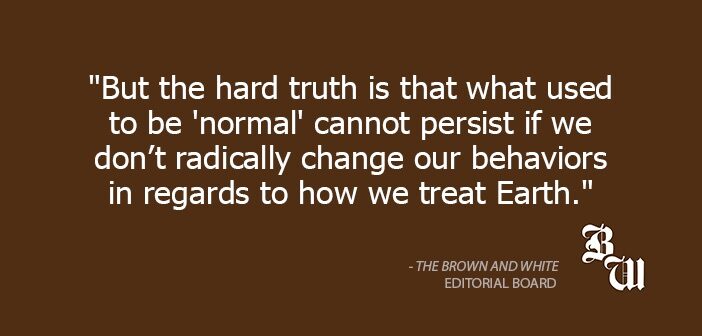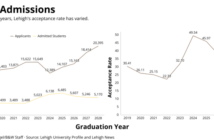Within the last two weeks, the southeast United States saw Hurricane Laura devastate many vulnerable coastal communities. Less than a month prior, Hurricane Isaias swept the entire East Coast from the Carribean all the way up to New York, causing power outages across the coastline, some of which lasted over a week.
Laura is the third storm within the past five years whose strength increased upon approaching land, which is atypical behavior for hurricanes as they usually slow down once they are near a shore.
NPR warned that Laura may be “unsurvivable” for certain areas of the U.S. as the country begins to experience an oncoming storm surge this hurricane season.
While there is countless evidence that these increasing intensities surrounding natural disasters is due to a variety of environmental changes the world is experiencing, storms are just one element of climate change.
In a conversation between Harvard’s T.H. Chan School of Public Health and Aaron Bernstein, the director of Harvard Chan C-CHANGE, the school published a variety of answers to questions regarding climate change and its potential relationship to the COVID-19 pandemic.
This conversation, which was documented on Harvard’s website, stated that “many root causes of climate change also increase the risk of pandemics,” explaining that efforts such as deforestation force animals and humans to share habitual environments thus causing more contact and the ability to share germs. Exposure to air pollution also makes individuals more prone to the worst side effects of respiratory illnesses.
Harvard’s webpage recommends reducing greenhouse gas emissions and containing global warming to a certain extent in hopes of limiting the types of crises the world has been experiencing for the past several decades.
Throughout the past six months, it has been easy to slap the “2020” label on reasons why certain national and global tragedies have occurred.
But it’s not just 2020.
It is the culmination of a century’s-plus worth of pollution, deforestation, plastic reliance and so on.
If we don’t act soon, the events that have occurred throughout 2020 will not only continue, but will worsen.
It is easy to put your blinders on and think that if we can make it to when the vaccine is released, then life will return to “normal.” But the hard truth is that what used to be “normal” cannot persist if we don’t radically change our behaviors in regards to how we treat Earth.
The Trump administration has made it alarmingly clear that climate change and other environmental-related issues are not top-of-mind and will continue to be a low priority if Trump were to be re-elected this coming November.
During his time in office, Trump has dismantled the Clean Power Plan, refused to pass essential bipartisan legislation to regulate a variety of air pollutant concerns, retracted previous emissions standards for motor vehicles and withdrew from the Paris Agreement, just to name a few.
The number one reason why the current administration is claiming to make these decisions and not progress on the right side of history in terms of climate change is due to the economic impact the coal, oil and gas industries would face as a result.
However, there is much evidence to prove that there is tremendous economic opportunity to transfer these jobs into safer, environmentally-friendly fields and transform us into a leader in green energy.
The Regional Greenhouse Gas Initiative is a market-based program concentrated in the Mid-Atlantic and Northeast focused on reducing emissions and creating cleaner, more sustainable and renewable energy sources. These initiatives not only help to better the physical world in which we live, but also create economic gains for these newer forms of energy.
There are many countries across the world that have made progress in the realm of clean energy, with Scotland generating enough wind power to fuel over 100 percent of every Scottish household, and Germany, which has been able to meet 78 percent of the country’s electric demand using completely renewable resources. It would do the U.S. — and the world — a tremendous amount of good to follow in their footsteps.
2020 is one of the only recent times in human history that everyone on the entire planet is going through the same thing. The threats of contracting and spreading coronavirus are the same to everyone worldwide, yet the same types of threats will continue to haunt us as time goes on if something does not change.
Enough of the “but it’s a global problem” mindset. Of course it is.
But we’ve tackled international crises before, head on, fueled by our responsibility to justice and our determination to break new ground.
We landed a man on the Moon. We liberated enslaved Jews, gays, minority groups and disabled peoples across Europe who were shackled to concentration camps.
Now we must undo the mess we have helped create. The science is clear. Not acting now because the problem is “inconvenient” to us is a luxury we quite literally can’t afford.
Not acting because the problem is inconvenient is a dereliction of duty.






Comment policy
Comments posted to The Brown and White website are reviewed by a moderator before being approved. Incendiary speech or harassing language, including comments targeted at individuals, may be deemed unacceptable and not published. Spam and other soliciting will also be declined.
The Brown and White also reserves the right to not publish entirely anonymous comments.
1 Comment
Global warming is a myth and being pushed by science deniers.